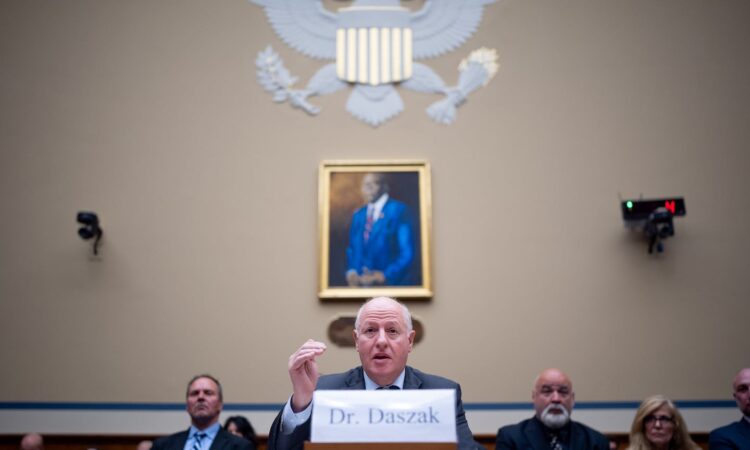
According to the Department of Health and Human Services, EcoHealth failed to adequately monitor and report on risky virus experiments at the Wuhan Institute of Virology, violating the terms of its federal grant and biosafety requirements. EcoHealth is now suspended from federal funding and will be potentially debarred, HHS said in its letter to the organization. Suspended and debarred organizations are ineligible to receive new federal contracts, grants and other types of funding from the United States.
EcoHealth Alliance has been the target of investigations since the earliest days of the pandemic, with the New York nonprofit facing accusations that its experiments with bat coronaviruses could have contributed to the development and spread of SARS-CoV-2, the virus linked to the deaths of millions of people around the globe.
President Donald Trump in April 2020 publicly questioned EcoHealth’s work in Wuhan — the city where the outbreak was first detected — and federal officials abruptly suspended a federal grant to the organization. That grant was restored last year over Republican objections. Federal officials have repeatedly pressed the organization to turn over documents, including a 2021 clash between officials and EcoHealth over unpublished data from a virus experiment involving mice.
EcoHealth and its defenders have said the organization is being scapegoated and that no evidence exists linking its work to the pandemic.
“We are confident that the bat coronavirus research conducted by EcoHealth Alliance and the Wuhan Institute of Virology could not have started the COVID-19 pandemic,” Peter Daszak, EcoHealth’s president, wrote last year in an email to The Washington Post.
EcoHealth on Wednesday said it would appeal federal officials’ decision to suspend funding.
Federal officials and scientists have said they are exploring the possibility that the coronavirus pandemic began from a natural spillover event or a leak from a laboratory. There is no evidence the Wuhan lab or any other research center possessed SARS-CoV-2 before the pandemic, and Daszak was among the most prominent voices in early 2020 arguing that the pandemic was probably sparked by a virus naturally spreading between animals and humans.
Members of Congress on Wednesday applauded the federal government’s decision to suspend funding.
Republicans this month issued a report that said EcoHealth and Daszak had acted with “contempt for the American people” and called for federal officials to cut funding to the organization. Democrats also released a report that concluded EcoHealth “did not cause the Covid-19 pandemic but did engage in questionable professional conduct” and asked whether the organization should continue to receive federal funds.
“EcoHealth’s immediate funding suspension and future debarment is not only a victory for the U.S. taxpayer, but also for American national security and the safety of citizens worldwide,” Rep. Brad Wenstrup (R-Ohio), who chairs the House panel investigating the coronavirus response, said in a statement.
“Every recipient of federal taxpayer funding has an obligation to meet the utmost standards of transparency and accountability to the American public,” Rep. Raul Ruiz (Calif.), the panel’s top Democrat, said in a statement. Ruiz cautioned that the decision to suspend funding to EcoHealth should not be regarded as evidence that the organization was linked to the pandemic.
Wenstrup, Ruiz and other members of their panel grilled Daszak on May 1 about EcoHealth’s work in China and its compliance with federal requirements, including why the organization waited nearly two years to submit a required report about the results of its research and activities leading up to the pandemic.
Investigators have also focused on a 2018 proposal by EcoHealth to experiment on bat coronaviruses, with Daszak suggesting that the work could be performed at the Wuhan Institute of Virology, according to documents first obtained by U.S. Right to Know, a nonprofit that has probed the origins of the virus. Federal officials at the Defense Advanced Research Projects Agency — known by the acronym DARPA — rejected the proposal, and EcoHealth officials have said they did not separately pursue the work detailed in that proposal, although the group collaborated on other research on bat coronaviruses in China.
HHS’s decision to cut funding to EcoHealth, citing the organization’s failures to inform federal officials of activities at the Wuhan lab, should raise doubts about whether EcoHealth’s broader claims are trustworthy, said Rep. Morgan Griffith (R-Va.), who chairs the House Energy and Commerce’s oversight panel and has investigated biosafety issues at laboratories.
“EcoHealth’s mismanagement, along with actions by the Wuhan Institute of Virology, have so clouded the issue, we may never know,” Griffith said in a statement. “But at the end of the day, I believe the evidence points to a lab leak as the most likely source.”
Scientists continue to debate the virus’s origins and call for more research into the work being done in China, including at a virtual roundtable on Tuesday convened by the Brookings Institution, a nonpartisan think tank.
“The strongest argument against a lab origin is that there’s no evidence that SARS-CoV-2 was present in the lab prior to the pandemic,” Jesse Bloom, a virologist at the Fred Hutchinson Cancer Center in Seattle, said at the Brookings event. But Bloom cautioned that “the argument is weakened” if there were active efforts to collect and modify coronaviruses at the Wuhan laboratory, given questions about whether China has been transparent about the lab’s work.
The federal government last year separately cut funding to the Wuhan Institute of Virology, saying the lab had failed to turn over key documents about its research.






